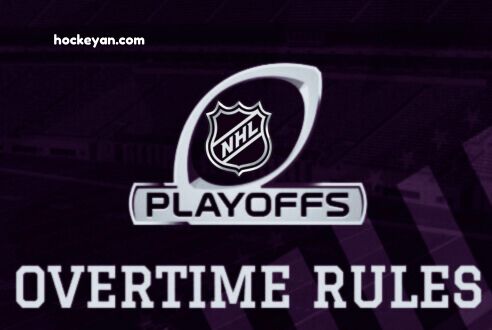Hockey Playoff Overtime Rules NHL! In NHL playoff overtime, teams play sudden-death periods until a goal is scored. Each period lasts 20 minutes.
Hockey fans eagerly anticipate the thrill of NHL playoff overtime. The intensity and excitement skyrocket as teams battle in sudden-death periods, where one goal decides the game. These 20-minute periods continue until a winner emerges, making every moment crucial and heart-pounding.
The stakes are higher, and the pressure mounts with each passing minute. Players push their limits, showcasing skill, strategy, and endurance. Fans remain on the edge of their seats, fully immersed in the drama and unpredictability of overtime. This unique format underscores the passion and competitiveness of hockey, creating unforgettable moments and lasting memories for everyone involved.
Introduction To NHL Playoff Overtime
NHL Playoff Overtime is thrilling. The rules make the game intense. Each game can change history.
Brief History
NHL Overtime rules have evolved. Before 1983, teams played sudden death. The first goal in overtime won the game.
In 1983, the NHL added a five-minute overtime. If no one scored, the game ended in a tie. Playoffs used a different rule. Teams played until someone scored.
Significance In Playoffs
Playoff Overtime is crucial. It can decide who wins the series. Teams must be strategic and cautious.
Every goal in overtime is golden. It can change a team’s fate. Fans watch with bated breath.
| Period | Duration | Outcome |
|---|---|---|
| Regular Season OT | 5 minutes | The game ends if no goal |
| Playoff OT | 20 minutes | The game continues until a goal |
Playoff Overtime rules make games exciting. Every moment counts. Teams give their best effort.
Credit: www.bostonglobe.com
Sudden Death Format
The Sudden Death Format in NHL playoff overtime creates intense excitement. This rule means the first team to score wins instantly. Fans love this thrilling edge-of-your-seat action.
Definition
In NHL playoffs, overtime is Sudden Death. Games tied after regulation go into overtime. The game ends as soon as a team scores. This rule applies from the first overtime period onward.
Impact On Game Dynamics
The Sudden Death Format changes how teams play. Players become more cautious yet aggressive. Coaches make quick decisions to seize scoring chances.
- Intensity Increases: Players give their all in every shift.
- Quick Substitutions: Coaches rotate players faster to keep them fresh.
- High Stakes: Every shot can be the game-winner.
| Aspect | Impact |
|---|---|
| Player Fatigue | Higher due to longer playtimes |
| Strategy | More focus on defense and counter-attacks |
| Fan Engagement | Increases due to the sudden end possibility |
Overtime in NHL playoffs is thrilling for both players and fans. The Sudden Death Format keeps everyone on the edge of their seats. Every moment counts. Every player tries their best. This format makes hockey playoffs unforgettable.
Overtime Procedures
Hockey playoffs are thrilling, and overtime adds even more excitement. The NHL has specific rules for playoff overtime to ensure fair and exciting gameplay. Let’s dive into the key aspects of these procedures.
Period Length
In NHL playoff overtime, each overtime period lasts 20 minutes. The game continues until one team scores a goal. This is known as sudden death. The team that scores first wins the game immediately.
Intermission Details
After regulation time ends, there is a brief intermission before overtime starts. This intermission lasts 15 minutes. During this time, teams can rest and strategize. The ice is also resurfaced to ensure smooth play.
If no goal is scored in the first overtime, another intermission occurs. This pattern repeats until a goal is scored.
| Period Type | Duration | Notes |
|---|---|---|
| Overtime Period | 20 minutes | Sudden death format |
| Intermission | 15 minutes | Ice resurfacing and team rest |
- Overtime periods are 20 minutes each.
- Intermissions between periods last 15 minutes.
- Play continues until one team scores a goal.
Credit: www.sportingnews.com
Team Strategies
Understanding team strategies in NHL playoff overtime is crucial. Teams adopt specific tactics to gain an edge. This section explores both offensive and defensive approaches.
Offensive Tactics
In overtime, teams focus on speed and precision. Players aim to control the puck and create scoring opportunities. Quick passes and fast breaks are key.
- Quick Passes: Players pass the puck rapidly to avoid turnovers.
- Fast Breaks: Teams push forward quickly to catch the defense off guard.
- Shot Accuracy: Players focus on accurate shots to increase scoring chances.
Offensive players often position themselves near the opponent’s goal. This tactic creates pressure and opportunities for rebounds.
Defensive Approaches
Defensive strategies are equally important in overtime. Teams focus on protecting the net and blocking shots.
- Shot Blocking: Defenders block shots to prevent goals.
- Strong Goaltending: Goalies must stay alert and ready.
- Clearing the Zone: Defensemen clear the puck from their zone quickly.
Defensive players also focus on tight-checking. This limits the opponent’s space and reduces scoring opportunities.
| Offensive Tactic | Defensive Approach |
|---|---|
| Quick Passes | Shot Blocking |
| Fast Breaks | Strong Goaltending |
| Shot Accuracy | Clearing the Zone |
Both offensive and defensive strategies are essential. Teams must balance them to succeed in playoff overtime.
Iconic Overtime Moments
Hockey Playoff Overtime Rules NHL are full of excitement. Overtime moments are the most thrilling. Fans hold their breath as the game extends. These moments often become legendary. Here, we look at some iconic overtime moments in NHL history.
Memorable Goals
Some goals are unforgettable. They happen in the blink of an eye. Below is a list of some memorable goals:
- Bobby Orr’s Flying Goal – 1970 Stanley Cup Finals.
- Steve Yzerman’s Double OT Goal – 1996 Western Conference Semifinals.
- Brett Hull’s Controversial Goal – 1999 Stanley Cup Finals.
- Alec Martinez’s Cup-Winning Goal – 2014 Stanley Cup Finals.
| Player | Moment | Year |
|---|---|---|
| Bobby Orr | Flying Goal | 1970 |
| Steve Yzerman | Double OT Goal | 1996 |
| Brett Hull | Controversial Goal | 1999 |
| Alec Martinez | Cup-Winning Goal | 2014 |
Historic Saves
Goals win games, but saves are just as vital. Here are some historic saves that turned the tide:
- Patrick Roy’s Glove Save – 1993 Stanley Cup Finals.
- Braden Holtby’s “The Save” – 2018 Stanley Cup Finals.
- Dominik Hasek’s Stop – 1999 Eastern Conference Finals.
- Ken Dryden’s Key Save – 1971 Stanley Cup Finals.
Each save changed the game’s course. They are etched in memory forever. These moments showcase the skill of NHL goaltenders.
Player Perspectives
Hockey playoff overtime rules in the NHL add excitement and pressure. Players face unique challenges during these intense moments. Their perspectives provide valuable insights into both the mental and physical aspects of the game. Understanding their experiences helps fans appreciate the dedication and skill involved.
Mental Preparation
Mental preparation is crucial for players during overtime. They need to stay focused and calm under pressure. Visualization techniques help players imagine successful plays. Meditation and breathing exercises reduce stress. Coaches often emphasize the importance of a positive mindset.
Players also rely on team support to stay motivated. Teammates encourage each other and maintain high spirits. Confidence and trust in their skills and strategies are essential. The mental game can often determine the outcome in these critical moments.
Physical Demands
The physical demands during overtime are intense. Players must maintain high energy levels. Endurance training plays a vital role in their preparation. Interval training and conditioning exercises build stamina. Nutrition and hydration are equally important. Proper diet and hydration ensure peak performance.
Injuries are more likely during these extended periods. Players need to be cautious and aware of their limits. Recovery techniques like ice baths and massages help in quick recovery. The physical toll is significant, but the drive to win keeps them going.
| Aspect | Details |
|---|---|
| Mental Preparation | Focus, Visualization, Meditation, Team Support |
| Physical Demands | Endurance, Nutrition, Injury Prevention, Recovery Techniques |
Hockey playoff overtime is a test of both mind and body. Players’ perspectives highlight the dedication required to succeed.
Rule Changes Over Time
The NHL playoff overtime rules have evolved significantly over the years. These changes aim to improve fairness and excitement in the game. This section delves into the historical amendments and current regulations shaping overtime play.
Historical Amendments
The NHL overtime rules have undergone numerous changes since their inception. Initially, overtime periods were non-sudden death, meaning the game continued for the full period, regardless of goals scored.
In the 1942-43 season, the league introduced sudden death overtime in the playoffs. This meant the first team to score would win. This rule significantly increased the intensity and excitement of playoff games.
In 1983, the NHL adopted a five-minute sudden-death overtime for regular-season games. If no goals were scored, the game ended in a tie. This rule aimed to reduce the number of tied games.
Current Regulations
Today’s NHL playoff overtime rules are more refined. The current regulations ensure fairness and excitement. Here is a breakdown of the key rules:
- Sudden Death: The first team to score wins the game.
- 20-Minute Periods: Overtime periods are 20 minutes long, similar to regular periods.
- Intermissions: A 15-minute intermission follows each overtime period.
- Unlimited Overtime: Overtime continues until a goal is scored, with no limit on the number of periods.
- Full Strength: Teams play at full strength, 5-on-5, during overtime.
These rules ensure a thrilling and fair conclusion to playoff games. Fans can expect high-stakes action, with each goal potentially ending the game.
Fan Experience
The excitement of NHL playoff overtime is unmatched. Fans are on the edge of their seats, waiting for the next big play. The atmosphere is electric, whether you’re in the stadium or watching from home.
In-stadium Atmosphere
Being in the stadium during NHL playoff overtime is unforgettable. The crowd roars with every shot on goal. People jump out of their seats, cheering their team. The energy is contagious, making the experience thrilling.
During overtime, the tension is high. Fans hold their breath during crucial moments. You can hear the collective sigh of relief or cheer of excitement. The atmosphere is intense and exhilarating.
| Element | Description |
|---|---|
| Noise Level | Loud and energetic |
| Fan Reactions | Cheering, gasping, chanting |
| Overall Feel | Electric and tense |
Broadcast Impact
Watching NHL playoff overtime on TV is equally engaging. Broadcasters capture the intensity of the game. They use multiple camera angles to show every moment. The commentary keeps viewers informed and excited.
Overtime periods often feature fewer commercials. This allows fans to stay immersed in the game. The uninterrupted action keeps viewers glued to their screens. The slow-motion replays enhance the viewing experience.
- Camera Angles: Multiple views of the action
- Commentary: Informative and exciting
- Commercials: Fewer interruptions
- Replays: Slow-motion highlights
Credit: www.tennessean.com
Frequently Asked Questions
What Are The Rules For NHL Playoff Overtime?
In NHL playoff overtime, teams play sudden-death 20-minute periods. The first team to score wins. There are no shootouts.
What Are The NHL Overtime Rules For 2024?
NHL overtime in 2024 features a 3-on-3 sudden death format lasting 5 minutes. If still tied, a shootout decides the winner.
How Much Time Between The 3rd Period And Overtime?
The time between the 3rd period and overtime is typically 15 minutes. This allows for a brief intermission.
What Was The Longest NHL Overtime Game?
The longest NHL overtime game happened on March 24, 1936. The Detroit Red Wings beat the Montreal Maroons after six overtimes. The game lasted 176 minutes and 30 seconds.
Conclusion
Understanding NHL playoff overtime rules can enhance your enjoyment of the game. These guidelines create thrilling moments. Fans love the excitement of sudden death over time. It’s what makes playoff hockey unique and unforgettable. Stay informed and enjoy every intense moment on the ice.







